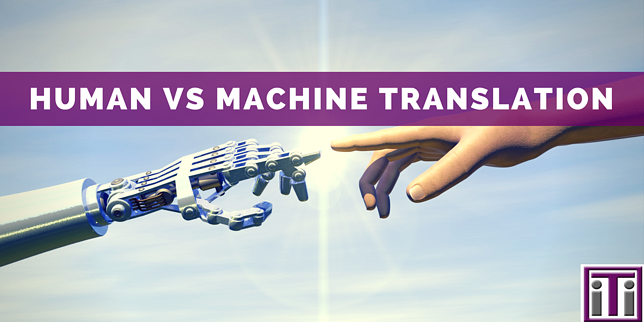
I admit it, I use Google Translate on a fairly regular basis. It’s mostly for casual word checks or to double check phrases people text me that I’m not totally certain of, especially when I have a feeling they are trying to be funny.
However, when the latter is the situation, I often find that Google helps very little because computer translation isn’t yet firm on its handle of local slang or words which have various local contexts.
Then, while in an international conference fully supported by simultaneous interpretation, I found myself marveling at the human ability to hear and translate in real time with little margin of error. There’s no way machine translation could piece together the witty banter between the two English executives and spit it out to a Colombian audience effectively, right? So when it comes to translation, where DO we stand in the humans vs machines race? How far away are we from a science fiction reality?
Progress in Translation Technology
Facebook and Google, amongst many others, have been chipping away at developing translation technology that can interpret words between multiple languages. Facebook’s coding blog states, “Language translation is important to Facebook’s mission of making the world more open and connected, enabling everyone to consume posts or videos in their preferred language — all at the highest possible accuracy and speed.” Understandably they want to bring their current 2 billion user community even closer together.
The Facebook Artificial Intelligence Research (FAIR) team, is developing a convolutional neural network (CNN) which translates 9x faster than current state of the art translation technology, including Google.
Currently, most translation programs translate by “reading a sentence in one language and predicting a sequence of words in another language with the same meaning– each word must wait until the network is done with the previous word” says Facebook, but their program will be able to give meaning to groups of words placed together, prioritizing what is being translated and the relationships between words. This allows for a more dynamic interpretation when converting sentences into another language. Their strategy “multi-hop” selects which words to prioritize during word-by-word translation, allowing for a better understanding of texts and the multiple meanings of words.
What about expressions of emotion, linguistic local color, and nuances in translation?
Personally, as a human trained by years of mistaking the context of words which change by region or with vocal tone, I really question a computer’s ability to correctly decipher emotion, linguistic local color, nuances, idioms and humor.
So, have there been any studies on these concerns? In February 2017 The Korea Times reported on a Korean translation competition in which “humans proved they [still] have the competitive edge in comprehension of original texts compared to translation programs, despite the rapid improvement of artificial intelligence (AI) technologies”.
The International Interpretation and Translation Association (IITA) and Sejong University held the competition between three translation programs by Google, Naver and Systran and four anonymous human translators. They were given two sets of original (never before translated) works in Korean and English in both literary and non-literary styles. On a 30-point scale, the human translators dominated, all receiving scores around 25 while the computers scored between 10-15. The Korea Times reported that Sam Kim, Vice President of Systran International’s Global Strategy Planning Office stated, “Reports by Google and Naver show such programs still make mechanical errors in processing subtle nuances and emotional expressions.”
Will translation technology ever replace human translators?
At what point will machines be able to understand all the contexts we have been socially coached to comprehend, whether it be via text or live/video translation? And what about perspective? What makes a good translator? Someone who has the largest vocabulary in two languages or someone also sensitive to social and cultural contexts? What about local language, constantly adapting with the current events and trends? Good translators know what sounds harsh in German to English speakers and therefore how to accurately translate it into English so it comes across as casual it was meant to be. Will machines ever really be able to do this?
BBC confirmed “puns, sarcasm, irony and culture-specific jokes are an interpreter’s nightmare” nevertheless they are able use cultural experience to translate humor to the best of their ability. Will machines be able to properly translate jokes one day without such cultural experience? Saltlux Vice President Shin Seok-hwan, as reported by the Korean Times, expects that, “humans can benefit from using these machines and [machines can] boost work efficiency of professional translators.”
So perhaps then, instead of being replaced, human will rely on machines to make translation times faster. As Mr. Kim of Systan International stated in regards to programs making mechanical errors with nuances and emotional expressions, most likely “humans and machines can collaborate.”
But for now, human translators still produce the only dependable, professional product.
About Interpreters and Translators, Inc.
iTi’s dedicated and experienced team offers a wide range of multilingual solutions for domestic and global corporations in a variety of industries. Do you require translation services to enhance your global marketing and sales initiatives or interpreter services to communicate across languages? We specialize in custom language solutions and work with over 200 languages so regardless of the barrier you face, we will work together in synergy to bridge the gap to ensure success. Please feel free to contact us through a message or by calling 860-362-0812. Our offices are open 24/7/365 so we can respond immediately to your interpreting or translation needs anytime, anywhere






Comments are closed here.